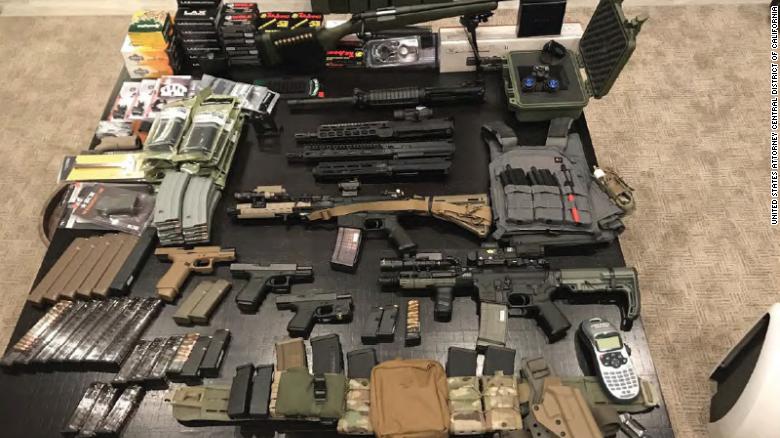
USA - США - SAD

- Posts : 7894
Join date : 2019-06-06
- Post n°703
 Re: USA - США - SAD
Re: USA - США - SAD
Trump Officially Nominates Amy Coney Barrett To The U.S.
_____
????

- Posts : 7666
Join date : 2020-03-05
- Post n°704
 Re: USA - США - SAD
Re: USA - США - SAD
Mnogo je interesantniji razgovor sa Bernijem Sendersom, gde ga pita “a šta će Demokrate da preduzmu ako republikanske države prekinu brojanje glasova koje su stigle poštom i izaberu republikanske elektore”. Odgovor Bernija: “narod neće dozvoliti”.Kirko Skaddeng wrote:pretpostavljam da će biti kenselovan zbog ovoga.
not.
Na kraju emisije je rekao “samo dvoje ljudi je godinama pričalo da Tramp neće dozvoliti poraz čak iako izgubi. Jedan je Tramp, drugi sam ja”, i pustio snimke iz svoje emisije gde se vidi da on već dve godine to priča. Dems i dalje nemaju strategiju za to, osim da izvedu narod na ulicu.
_____
"Burundi je svakako sharmantno mesto cinika i knjiskih ljudi koji gledaju stvar sa svog olimpa od kartona."
“Here he was then, cruising the deserts of Mexico in my Ford Torino with my wife and my credit cards and his black-tongued dog. He had a chow dog that went everywhere with him, to the post office and ball games, and now that red beast was making free with his lion feet on my Torino seats.”

- Posts : 7894
Join date : 2019-06-06
- Post n°705
 Re: USA - США - SAD
Re: USA - США - SAD
boomer crook wrote:https://www.thenation.com/article/politics/amy-coney-barrett-extremist/
If Barrett ruled like a devout Catholic all the time, that would be one thing. But she doesn’t. She rules like an extremist conservative all the time, she just uses religion to justify those extremist positions when it is convenient for her to do so. She ignores the moral and ethical underpinnings of her faith, when they conflict with the cruel requirements of conservative dogma.
Slusao sam u podcastu Voxovom kod Ezre Klajna, bio je Rod Dreer gost, davno je to dosta bilo, pre svega ovoga. I pita ga Ezra zaasto kad govori o dekadenciji o kraju hriscanskog drustva itd, uvek uzima te primere: homoseksualnost, transrodna pitanja, sve veci broj razvoda, kad moze uzeti potpuno druge pojave i podjednako reci da je to posledica napustanja vere: na primer klasne razlike, prevelik uticaj bogatih na politiku, ocajno stanje javnih sluzbi, pre svega zdravstva.
I nema ovaj nista da mu odgovori. Kaze pisao sam ja i o tome, mislim jeste al mnogo manje nego sto je pisao o drag queens.
Mislim da je to u osnovi isti fenomen, ona ne moze kao hriscanka da glasa z smrtnu kaznu, al moze za neljudske uslove rada i za ogromnu moc korporacija.
Sve je to jedan go kurac, i jako je tuzno.
Edit: ono sto nacelno ocekujem je jedna divljacka svadja izmedju bele srednje klase o tome da l moze da bude konzervativnog feminizma (mislim sad moze jebiga, kad je trebalo da se osvajaju slobode onda nije moglo da bude). I dok se javnost bude bavile time, sud ce glasa u korist korporacija i niko primetiti nece.
_____
????

- Posts : 41629
Join date : 2012-02-12
Location : wife privilege
- Post n°706
 Re: USA - США - SAD
Re: USA - США - SAD
Колико се дознајем у хришћанство, увек су били такви: грех је шта се чини курцем и околином, не шта се чини бајонетом и парама. Није тлачење грех, него таслачење. Јер, шта је грех? Штагод они ставе на списак, сами су га измислили.
_____
cousin for roasting the rakija
И кажем себи у сну, еј бре коњу па ти ни немаш озвучење, имаш оне две кутијице око монитора, видећеш кад се пробудиш...

- Posts : 5594
Join date : 2016-01-26
- Post n°707
 Re: USA - США - SAD
Re: USA - США - SAD
Сада ћу извадити нешто из малог мозга, знам да сам слушао неки подкаст који је имао тему типа : хришћанство и ратовање.
Цела правна и теолошка мисао раног и средњег Хришћанства река радила је на једној ствари - ако знамо да је убиство смртни грех, зар нису сви војници и генерали учиниоци смртног греха? Ако нису, супер. Ако пак и јесу, да ли се могу искупити од греха?
Аугустинци су смислили доктрину и законе праведног рата (jus bello justo). Ако силом спречиш убиство другог, па чак и убивши нападача, не чиниш зло. Овај принцип се примењује и на рат, о сваком рату као насиљу се суди. Пре кретања у рат војска мора добити благослов и мора се придржавати ратног права. Ако тако чини, има опрост греха.
Цела правна и теолошка мисао раног и средњег Хришћанства река радила је на једној ствари - ако знамо да је убиство смртни грех, зар нису сви војници и генерали учиниоци смртног греха? Ако нису, супер. Ако пак и јесу, да ли се могу искупити од греха?
Аугустинци су смислили доктрину и законе праведног рата (jus bello justo). Ако силом спречиш убиство другог, па чак и убивши нападача, не чиниш зло. Овај принцип се примењује и на рат, о сваком рату као насиљу се суди. Пре кретања у рат војска мора добити благослов и мора се придржавати ратног права. Ако тако чини, има опрост греха.
_____
Burundi is an exception among other nations because it is a country which gave God first place, a God who guards and protects from all misfortune.
Burundi... opskurno udruženje 20ak levičarskih intelektualaca, kojima je fetiš odbrana poniženih i uvredjenih.

- Posts : 41629
Join date : 2012-02-12
Location : wife privilege
- Post n°708
 Re: USA - США - SAD
Re: USA - США - SAD
Ето, а за јебање под утицајем надахнућа нису се сетили. Јер тим желе да управљају. А ратови нису на одмет, увек постоји шанса да тамо стекну нове другове чланове.
_____
cousin for roasting the rakija
И кажем себи у сну, еј бре коњу па ти ни немаш озвучење, имаш оне две кутијице око монитора, видећеш кад се пробудиш...

- Korisnik

- Posts : 4670
Join date : 2015-02-17
- Post n°709
 Re: USA - США - SAD
Re: USA - США - SAD
Here's every time Lindsey Graham begged for money over the last few days and holy shit is he pathetic. pic.twitter.com/CzOTavhVkQ
— Brian Tyler Cohen (@briantylercohen) September 25, 2020

- Posts : 7894
Join date : 2019-06-06
- Post n°710
 Re: USA - США - SAD
Re: USA - США - SAD
sa vikipedije
He later served as a lobbyist for the Podesta Group.[4][10] His clients at the Podesta Group included banks such as Bank of America and Wells Fargo, financial giants Berkshire Hathaway and Avenue Capital Management,[11] pharmaceutical companies Merck[12] and Amylin, casinos such as Caesars and Harrah's; the American Coalition for Clean Coal Electricity; Walmart,[13] General Motors, Google, and Lockheed Martin.[14] In addition to lobbying work at Podesta Group, he has also lobbied on behalf of United Way Worldwide and the Association of Public and Land-grant Universities.[5]
In May 2013, Harrison became the chair of the South Carolina Democratic Party. He is the first African American to have served in this role
_____
????

- Guest
- Post n°711
 Re: USA - США - SAD
Re: USA - США - SAD
Exclusive: The Times has obtained tax-return data for President Trump extending over more than two decades.
— The New York Times (@nytimes) September 27, 2020
It shows his finances under stress, beset by losses that he aggressively employs to avoid paying taxes and hundreds of millions in debt coming due. https://t.co/gstfYLEe5V

- Posts : 7666
Join date : 2020-03-05
- Post n°713
 Re: USA - США - SAD
Re: USA - США - SAD
https://www.cnn.com/2020/09/29/us/man-arrested-driving-into-crowd-with-firearms-trnd/index.html
Ne mogu da prestanem da se smejem. Prvo slika:

Pa ime: Benjamin Jong Ren Hung. Za prijatelje Ben Well Hung.
Pa lektira na temu drugog Amandmana.

Ni manjeg coveka ni veceg arsenala. Vecina tih ludaka bar izgleda zajebano ili neuracunljivo. Ovaj izgleda kao da je na 2 malo jaca samara od spoznaje da je krenuo pogresnim putem.
Ne mogu da prestanem da se smejem. Prvo slika:

Pa ime: Benjamin Jong Ren Hung. Za prijatelje Ben Well Hung.
Pa lektira na temu drugog Amandmana.

Ni manjeg coveka ni veceg arsenala. Vecina tih ludaka bar izgleda zajebano ili neuracunljivo. Ovaj izgleda kao da je na 2 malo jaca samara od spoznaje da je krenuo pogresnim putem.
_____
"Burundi je svakako sharmantno mesto cinika i knjiskih ljudi koji gledaju stvar sa svog olimpa od kartona."
“Here he was then, cruising the deserts of Mexico in my Ford Torino with my wife and my credit cards and his black-tongued dog. He had a chow dog that went everywhere with him, to the post office and ball games, and now that red beast was making free with his lion feet on my Torino seats.”

- Posts : 11623
Join date : 2018-03-03
Age : 36
Location : Hotline Rakovica
- Post n°714
 Re: USA - США - SAD
Re: USA - США - SAD
Nakupuješ ovoliko oružje, a onda uletiš kamionom u gomilu. Da me časni forum ne razume pogrešno, ali ono...
_____
Sve čega ima na filmu, rekao sam, ima i na Zlatiboru.
~~~~~
Ne dajte da vas prevare! Sačuvajte svoje pojene!

- Guest
- Post n°716
 Re: USA - США - SAD
Re: USA - США - SAD
The CBO projecting there will be ~15 million fewer Americans in 2050 than they projected just last year. https://t.co/DskJvJiG4h
— David Wallace-Wells (@dwallacewells) September 30, 2020

- Posts : 41629
Join date : 2012-02-12
Location : wife privilege
- Post n°717
 Re: USA - США - SAD
Re: USA - США - SAD
Остали неће бити држављани.
_____
cousin for roasting the rakija
И кажем себи у сну, еј бре коњу па ти ни немаш озвучење, имаш оне две кутијице око монитора, видећеш кад се пробудиш...

- Posts : 7894
Join date : 2019-06-06
- Post n°718
 Re: USA - США - SAD
Re: USA - США - SAD
necu da kacim na film posto je potpouno politicka stvar
The cast of HBO’s adaptation of Ta-Nehisi Coates’ “Between the World and Me” just keeps on getting bigger and more stellar.
This time around, nine new players have joined the fray, including Mahershala Ali, Angela Davis and Ta-Nehisi Coates himself. HBO has also announced that the special will premiere Saturday, Nov. 21 at 8 p.m. ET/PT.
The cast of HBO’s adaptation of Ta-Nehisi Coates’ “Between the World and Me” just keeps on getting bigger and more stellar.
This time around, nine new players have joined the fray, including Mahershala Ali, Angela Davis and Ta-Nehisi Coates himself. HBO has also announced that the special will premiere Saturday, Nov. 21 at 8 p.m. ET/PT.
_____
????

- Guest
- Post n°719
 Re: USA - США - SAD
Re: USA - США - SAD
How Trump Brought Home the Endless War
By Stephen Wertheim
October 1, 2020
Every generation delivers its own update to the worry, as old as democracy, that military crusades abroad will come back to damage freedom at home. The Founders of the United States, haunted by ancient Rome’s descent from republic to empire, resisted establishing a standing army. At the end of the First World War, the American Civil Liberties Union formed in opposition to mass arrests and deportations carried out by the Department of Justice. In our own time, it seemed apparent, until recently, that the main blowback of the war on terror would be the surveillance state inaugurated by the Patriot Act of 2001. Yet, while troubling, mass surveillance did not prompt most Americans to think that their country had become fundamentally unfree. The link between foreign intervention and domestic repression retained an almost metaphorical quality, as when Secretary of State John Quincy Adams warned, in 1821, that if it became “the dictatress of the world,” America “would be no longer the ruler of her own spirit.”
What is under way now, during the Presidency of Donald Trump, is something different. War—its implements, its enmities—pervades civic life. In June, the National Guard deployed to the streets of Washington, D.C., in the face of largely peaceful protests against police brutality and systemic racism, and active-duty troops were stationed outside the city. “You have to dominate,” Trump told the nation’s governors. In July, his Administration sent to Portland, Oregon, paramilitary-style agents who forced people into unmarked cars, predictably causing resistance to swell. The President kicked off September by visiting the scene of police and paramilitary shootings in Kenosha, Wisconsin. After making excuses for Kyle Rittenhouse, his seventeen-year-old supporter charged with using a military-style rifle to commit two homicides, Trump crowed that “all the violence is coming from the left” and is “really domestic terror.” At Tuesday’s debate, asked to condemn white supremacists, Trump appeared to encourage them instead, telling the far-right Proud Boys to “stand back and stand by.”
As the war on terror loses its emotive force, American leaders cast fellow-citizens as akin to foreign enemies. Senators call for an “overwhelming show of force” against protesters with the knee-jerk zeal once reserved for distant peoples. Endless war has not merely come home; endless war increasingly is home. American politics has taken on the qualities of American wars.
According to a great deal of prevailing wisdom, this was not supposed to happen. Politicians and intellectuals often hold up America’s armed leadership of the world as one of the last remaining sources of unity at home. Inverting John Quincy Adams, they assume that global dominance is part of the solution to political division, not one of its sources.
They think so for a reason. American society reaped certain gains from the international struggles of the twentieth century. Fascists in the Second World War and communists in the Cold War offered the global masses an alluring model of modernity. Competing with them spurred the United States to make sure it delivered material abundance to its own people. From the nineteen-forties to the sixties, the United States enjoyed not only stellar rates of economic growth but also greater equality in incomes than before or since. The Cold War played a role in this success. Capital put a ceiling on its share of the gains; labor remained resolutely anti-communist in return. Then, as colonized peoples broke free of their imperial masters, U.S. leaders grew embarrassed by racist violence and segregation at home, spotlighted by Soviet propaganda. As the historian Mary Dudziak has shown, some came to favor civil-rights legislation partly in order to win hearts and minds around the globe.
Even then, however, military mobilization came at a steep price. Throughout the Second World War, the government baselessly interned around a hundred and twenty thousand persons of Japanese ancestry. The Cold War unleashed Senator Joseph McCarthy’s attacks on alleged subversives and left a legacy of demagoguery and paranoia. And, although the Cold War spurred civil-rights reforms, it also contained them. The result, as Dudziak argues, was a series of formal, legal improvements that could be touted abroad even as social and economic inequalities persisted at home. Perhaps the United States would have achieved more progress, and faster, had it never mobilized against outside foes.
However one assesses the record, the domestic effect of foreign antagonism has never been straightforward. It depends on the forces ascendant within the United States. It also hinges on how America defines its adversary and how the two define what they are competing to achieve. In fighting the other, we remake ourselves. So far, the twenty-first century looks much less auspicious than its predecessor.
Even before the attacks of September 11, 2001, the United States was fracturing. Bitter partisanship, culture wars, and economic stagnation led the writer David Brooks to travel to some red states. “Are Americans any longer a common people?” he asked. After 9/11, he answered yes, in large part because he believed the attacks were having the effect of healing the nation’s wounds. Their aftermath, Brooks concluded, “has been a bit like a national Sabbath, taking us out of our usual pleasures and distractions and reminding us what is really important.”
The President agreed. On September 15, 2001, George W. Bush declared, “A terrorist attack designed to tear us apart has instead bound us together as a nation.” America’s indulgent interlude after the Cold War had ended; in taking up arms, the nation would find its purpose and keep the carnage away. Bush maintained this view to the end of his tenure, telling the American Legion, in 2007, “Our strategy is this: we will fight them over there so we do not have to face them in the United States of America.” Becoming the dictatress of the world would renew America’s spirit.
Bush’s argument depended on the very thing that made it fail—his refusal to limit the enemy to the Al Qaeda organization that perpetrated the attacks. Wishing to cast the United States as the liberator of mankind, Bush defined the enemy variously as terror, tyranny, and evil. The result was to render the United States under permanent assault and require it to wage permanent war. Nor did President Barack Obama solve the problem by substituting Bush’s grandiose nouns for the lower-key “violent extremism.” That, too, was an ineradicable feature of the world, and Obama’s Administration acted accordingly. Even after killing Osama bin Laden, the United States under Obama expanded its officially acknowledged warfighting to seven countries: Afghanistan, Iraq, Libya, Pakistan, Somalia, Syria, and Yemen. (The war on terror’s actual scope is wider; researchers at Brown University counted fourteen countries in which U.S. troops saw combat to fight terrorism in 2017 and 2018.)
Many Americans looked at the actions of their government and wondered who the enemy really was. Bush and Obama maintained that America was not fighting Islam, only select malefactors who hijacked the true faith. Yet why was the United States invading, occupying, or bombing much of the Muslim world? And if the enemy lay across the greater Middle East, then who were “we”? In the twentieth century, American leaders advanced a plausible claim that they were acting to prevent the Axis powers and then Soviet-backed Communism from achieving world domination. But Al Qaeda and other terrorist adversaries were different; they threatened lives but were too weak to hold territory beyond their own region. This time, if any power was seeking to dominate the world by force, the most obvious candidate was the United States, the sole superpower, which opted to extend its globe-spanning armaments after the Soviet Union collapsed. Its leaders said almost as much. “If we have to use force, it is because we are America; we are the indispensable nation,” Secretary of State Madeleine Albright declared, in 1998. “We stand tall and we see further than other countries into the future.”
Albright summed up the bipartisan consensus: the United States had the right and responsibility to determine the fate of the world. The world, in turn, consisted of either threats or wards. They waited upon America to defeat them or lead them.
Actual people turned out to have other ideas. The United States faced a crossroads from 2005 onward, once Iraqis, Afghans, Libyans, and others refused to follow America’s script and instead resisted violently. Leaders and intellectuals in the United States had to explain what had gone awry. They might have decided that the United States had acted aggressively—that it was wrong to invade and occupy countries, that those on the receiving end understandably struck back. But they did not. President Obama called the invasion of Iraq a “dumb war” but not an illegal war of aggression, as the United States would have judged it had any other power launched it. Part of the country was left to conclude that the United States was not too domineering but, rather, too meek, too willing to trust that Muslims in particular and foreigners in general would gladly receive the gift of freedom that America bestowed. To win the war, to restore its rightful place of mastery, America would have to get tough.
This kind of war could not be confined outside the United States proper. The same categories of people whom the United States continually killed—whether construed as Muslim, Arab, Middle Eastern, brown, or colored—were also inside America, as citizens and immigrants. The foreign enemy could easily morph into the enemy within.
Endless war began to come home on America’s southern border. In “The End of the Myth,” the historian Greg Grandin describes two surges of anti-immigrant vigilantism. The first came with the launch of the Minuteman Project, in 2005, the year a majority of Americans turned against the Iraq War. Founded by Jim Gilchrist, a Vietnam veteran, the Minuteman network claimed to seek an end to illegal immigration coming from Mexico. Volunteers in Long Island, Kansas City, and San Clemente patrolled their communities to catch undocumented immigrants and either turn them over to law enforcement or harass them directly. The vigilantes located the border, as one leader put it, “all over America.”
A second infusion occurred during Obama’s second term, as young service members returned from battle and Central American migration swelled. For some, the country’s foreign threats melded together; the head of the group Arizona Border Recon claimed to spot “Somalis and Middle Eastern guys with beards and everything else” among the border crossers. Trump rode nativist militancy to the White House. Throughout his 2016 campaign, he jumbled “radical Islamic terrorism” and Central American migrants into a single spectre of nonwhite threat. Two years later, as President, he warned that a caravan of migrants arriving from Central America constituted an “invasion of our country.” Trump declared a national emergency and ordered the U.S. military to the border. “Criminals and unknown Middle Easterners are mixed in,” Trump tweeted.
From the beginning of his right-wing ascent, Trump also connected African-Americans to the foreign threat. By promulgating the lie that Obama was foreign-born, Trump implied that America’s first Black President was subverting the nation. As soon as this summer’s Black Lives Matter protests began, the President and his allies treated any violence not merely as lawbreaking but as an attack on the country as grave as an outside invasion. Four days after police killed George Floyd, Trump warned that “when the looting starts, the shooting starts,” a word-for-word echo of segregationists. Then he had peaceful protesters tear-gassed in Washington’s Lafayette Square so that he could cross the street, flanked by Defense Secretary Mark Esper and General Mark Milley, the chairman of the Joint Chiefs of Staff, to be photographed holding a Bible outside St. John’s Episcopal Church. The military, dispatched to the southern border two years before, took up positions in the nation’s capital.
In case the theatrics did not speak for themselves, the Administration did plenty of talking. “Most of you are weak,” Trump told state leaders, egging them on to deploy the National Guard. Esper urged them to “dominate the battlespace,” by which he meant U.S. cities. The vocabulary of the war on terror exploded into domestic life. Trump referred to Portland’s racial-justice protesters as a “beehive of terrorists” as he threatened to send in the National Guard to smoke them out. The protesters “hate our country,” Trump said. He called the whole situation “worse than Afghanistan.” It’s a phrase he often applies to cities with large Black populations, including Chicago, which also received what the President characterized as a “surge” of federal security forces.
Having come to power exploiting the fears spawned by perpetual war abroad, Trump is defining the enemy of his war at home just as expansively. “To stop the political violence,” he said in Kenosha, “we must also confront the radical ideology that includes this violence.” For Trump, this allegedly radical ideology pushes “the destructive message that our nation and our law enforcement are oppressive or racist.” The implication is that anyone who objects to police brutality or racism is abetting insurrectionist violence. Either you are with Trump, in other words, or you are with the terrorists.
If he loses the election in November, will he step aside in deference to those he claims would destroy the country? Will his supporters? This summer the United States entered into a condition of “incipient insurgency,” in the estimation of David Kilcullen, a former adviser to the Army. The vast majority of protests associated with Black Lives Matter have been completely peaceful, but twenty violent groups, both left and right, have entered the fray, in addition to individual attackers and routine shootings by police. In the name of law and order, the President has stoked one side of the violence, encouraging toughness by police and militias and waving away the lethal conduct of Trump supporters like Kyle Rittenhouse.
The Republican National Convention made clear that Trump is no longer running against the establishment. This time around, he is running a militant campaign against the half of the country that rejects his rule and is certain to vote against him in November. “If the Democrat Party wants to stand with anarchists, agitators, rioters, looters, and flag burners, that is up to them,” Trump declared in his seventy-minute address. He has since suggested that protesters are well funded, organized, and part of a coup to take him down. The Department of Homeland Security indicates otherwise; it reportedly projects that white supremacists, not left-wing radicals, will remain the most “persistent and lethal threat” in the United States in the next year. At what point might America’s cold civil war become hot? Has it already?
https://www.newyorker.com/news/our-columnists/how-trump-brought-home-the-endless-war

- Posts : 15552
Join date : 2016-03-28
- Post n°720
 Re: USA - США - SAD
Re: USA - США - SAD
https://www.facebook.com/AshleaHellmannJD/posts/1067970320303388
_____
Što se ostaloga tiče, smatram da Zapad treba razoriti
Jedini proleter Burundija
Pristalica krvne osvete

- Posts : 7894
Join date : 2019-06-06
- Post n°721
 Re: USA - США - SAD
Re: USA - США - SAD
Amy Coney Barrett negativna na covid19 

_____
????

- Posts : 7666
Join date : 2020-03-05
- Post n°722
 Re: USA - США - SAD
Re: USA - США - SAD
Jedan republikanski glas za Ejmi manje - senator iz Jute pozitivan na Covid.
In other news:
In other news:
What will happen next in 2020?
— Matt Taibbi (@mtaibbi) October 2, 2020
_____
"Burundi je svakako sharmantno mesto cinika i knjiskih ljudi koji gledaju stvar sa svog olimpa od kartona."
“Here he was then, cruising the deserts of Mexico in my Ford Torino with my wife and my credit cards and his black-tongued dog. He had a chow dog that went everywhere with him, to the post office and ball games, and now that red beast was making free with his lion feet on my Torino seats.”

- Posts : 7666
Join date : 2020-03-05
- Post n°723
 Re: USA - США - SAD
Re: USA - США - SAD
Još jedan republikanski senator oboleo od korone. Ejmi kadar nevera, izbor za sudiju tako blizu a tako daleko. RBG gleda odozgo i šalje one finger salute.
_____
"Burundi je svakako sharmantno mesto cinika i knjiskih ljudi koji gledaju stvar sa svog olimpa od kartona."
“Here he was then, cruising the deserts of Mexico in my Ford Torino with my wife and my credit cards and his black-tongued dog. He had a chow dog that went everywhere with him, to the post office and ball games, and now that red beast was making free with his lion feet on my Torino seats.”

- Posts : 7894
Join date : 2019-06-06
- Post n°724
 Re: USA - США - SAD
Re: USA - США - SAD
Vilmos Tehenészfiú wrote:Još jedan republikanski senator oboleo od korone. Ejmi kadar nevera, izbor za sudiju tako blizu a tako daleko. RBG gleda odozgo i šalje one finger salute.
fact check: false.
za 14 dana se oprave, 15tog glasaju, do izbora mogu svi se razbole po jos dva puta.
Laura Linney da glumi ACB u filmu, film da se zove "Zivot"
Edit; kako se izbori priblizavaju ocekujte da cu sve vise i vise da ludim, dok ne kulminira sa tradicionalnim teranjem u kurac u novembru. It's the American way.
_____
????

- Posts : 7666
Join date : 2020-03-05
- Post n°725
 Re: USA - США - SAD
Re: USA - США - SAD
Shvati to kao visinske pripreme za dolazak u Ameriku.
_____
"Burundi je svakako sharmantno mesto cinika i knjiskih ljudi koji gledaju stvar sa svog olimpa od kartona."
“Here he was then, cruising the deserts of Mexico in my Ford Torino with my wife and my credit cards and his black-tongued dog. He had a chow dog that went everywhere with him, to the post office and ball games, and now that red beast was making free with his lion feet on my Torino seats.”



 by Guest Sat Sep 26, 2020 9:40 pm
by Guest Sat Sep 26, 2020 9:40 pm
 Јанош Винету
Јанош Винету